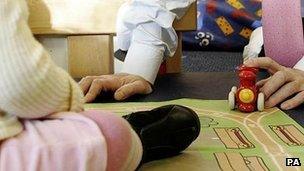Think-tank voices concern over Scottish nursery provision 'gap'
- Published

Reform Scotland said nursery provision should start at a fixed point in the year
Only half of children born in 2011 and 2012 will be guaranteed two years of nursery provision, according to research by Reform Scotland.
The think-tank said current entitlement to Scottish government-funded places could vary by up to 317 hours, or £1,033, based on date of birth.
It warned proposed Scottish government reforms would widen the gap to 400 hours, or £1,305.
Ministers said the system would save parents up to £700 a year.
The Reform Scotland report came on the day that government plans to increase funding for older nursery children - as well as proposals to appoint a state guardian for every child and boost support for kinship carers - were approved in principle at Holyrood.
MSPs backed the Children and Young People Bill, external at the first of its three stages of parliamentary scrutiny.
Reform Scotland research director Alison Payne said: "These new figures will come as a shock to many people and the cause of the unfairness can be easily remedied. Parliament can right this wrong.
"The solution is simple: Just as all children are entitled to seven years of primary education irrespective of their date of birth, they should be entitled to a basic two years of government-funded nursery provision.
"To achieve this, Reform Scotland believes that nursery provision should start at a fixed point in the year, probably in August, just as it does for school.
"Our solution would ensure that all children had a legal entitlement to two years' government-funded nursery provision and looked-after children would receive a full additional year's provision."
The research suggested that a child born between 1 March and 31 August would be entitled to two years' nursery provision before beginning school.
A child born between 1 September 1 and 31 December would get 18 months and a child born between 1 January and 28 February, assuming he or she attends school aged four, would get 15 months.
A Scottish government spokeswoman defended the system, saying it would save parents of three and four-year-olds, as well as some vulnerable two-year-olds, up to £700 a year.
"We are providing an extra £50m to councils in 2014-15, as part of a total package of £190m, to help them meet that extra demand," she said.
"The priority for the Scottish government at this stage is to build additional hours and flexibility into high-quality childcare, increasing the entitlement to around 16 hours a week. This is a huge step forward in improving our young children's prospects and supporting parents.
"Some variation will remain whether a child begins nursery on their birthday or the following term, but this system currently makes the best use of the entitlement in relation to the child's age and needs with parents of younger children able to defer school if they feel it best."
State guardians
Conservative MSP Liz Smith backed calls for a fixed starting point.
"Reform Scotland has exposed the truth that the so-called guarantee doesn't do what it says on the tin," she said.
"Parents up and down the country will rightly wonder how it can be that children born only days apart can receive such varying levels of nursery care."
Liberal Democrat MSP Liam McArthur said the government should show more ambition, particularly for two-year-olds from the poorest backgrounds.
"Children 1st and others have warned there is a risk that children in Scotland could fall behind their counterparts south of the border unless improvements are made to the bill," he said.
"Alex Salmond promises this will all change with independence. A growing chorus of voices, however, are demanding action on better childcare now and not on the basis of how they vote in a referendum in the future."
The Children and Young People Bill also includes plans to appoint a state guardian for every child, boost support for kinship carers and increase funding for older nursery children.
The debate on the bill can be watched at BBC Scotland's Democracy Live website .
- Published3 October 2013
- Published23 September 2013
- Published17 September 2013
- Published10 September 2013
- Published25 July 2013
- Published18 April 2013
- Published24 January 2013
- Published4 July 2012